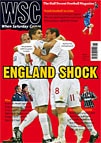 National tensions are expressing themselves through Belgium's two biggest clubs. John Chapman looks at the latest instalment
National tensions are expressing themselves through Belgium's two biggest clubs. John Chapman looks at the latest instalment
Anderlecht’s Marcin Wasilewski has twice made the front cover of Belgium’s leading football magazine in recent weeks: once when he was using his elbows to great effect against Standard Liège and then being stretchered off against the same club.
Axel Witsel’s lunge on the Polish international – that resulted in a double open fracture of Wasilewski’s right leg – is now a YouTube hit. Feelings between the two clubs soon reached fever pitch with death threats being made against Witsel and Standard’s captain Steven Defour. But the enmity does not wholly relate to that tackle – as bad as it was. It goes back to the early 1960s when the two clubs came to dominate Belgian football, winning 16 titles between them from 1961 to 1983. Anderlecht were the city slickers, while Standard drew their support from the steelworks and iron foundries of Liège.
The already bitter rivalry took a turn for the worse in 1983. Standard’s coach Raymond Goethals – with his club two points off the title and a few days before Liège’s appearance in the European Cup-Winners Cup final – asked his league opponents Waterschei to take it easy in return for “cash in hand”. Liège subsequently won the title but the truth emerged and 13 players were banned; Goethals was disqualified from coaching in Belgium for life.
That led to 25 years in the football wilderness for Standard, during which time Anderlecht won titles, European trophies and later made regular appearances in the Champions League. Perhaps Anderlecht became lazy. They certainly didn’t invest wisely after a good run in the 2000 Champions League allowed them to cash in on Jan Koller, Tomasz Radzinski and Bart Goor. Usually they did just enough to win the title (with five championships between 2000 and 2007), but during this time, Liège vice-president Luciano d’Onofrio was making plans.
An expensive academy was built and it quickly bore fruit: teenagers Witsel and Marouane Fellaini emerging to join Defour (who walked out on Genk at the age of 18) and Dieumerci Mbokani – totally ignored in his time at Anderlecht and now a target for several Premier League clubs. The young side clicked under Michel Preud’homme and in 2008, 25 years on from the Waterschei scandal, Standard were champions.
Despite Fellaini leaving, Defour and Witsel came to the fore and Liège had an excellent 2009 season. They were matched by Anderlecht every step of the way and on the last day, the clubs were level: Standard visited Ghent, now managed by Preud’homme, and Anderlecht went to Genk. Anderlecht won easily and started celebrating the championship after they heard that Ghent had been awarded a last-minute penalty that would take the championship to Brussels. Ghent captain Bryan Ruiz (rumoured to be on his way to Standard Liège at the time) stepped up and missed from the spot – a miss thought by Anderlecht to be “tactical”.
With the teams finishing level on points, two play-off matches were necessary. With direct entry to the Champions League – and €15 million (£13.8m) – up for grabs, the games were always going to be blood and thunder affairs. Liège triumphed over the two legs and Wasilewski’s use of his elbows got a lot of post-play-off publicity.
Move forward to September 2009. Liège had started the season badly and Anderlecht were looking for revenge. Liège’s coach Laszlo Boloni – unhappy about recent performances – called for his players to start “playing like bastards”. With weak refereeing, the inevitable happened: the crunching tackle on Wasilewski sent him to hospital. Amid rumours that the Pole would never play again, the two clubs’ management teams were incommunicado. Finally, Anderlecht president Roger Vanden Stock said he would offer a hand of friendship to Standard, with the proviso that if Wasilewski wanted to launch a private prosecution the club would support him.
For now, one could argue that this deep-seated rivalry has Walloon-Flemish roots and this is certainly true of the attitudes in the media, with the severest criticism of Witsel coming from the Flemish press. Following the death threats, Witsel’s family were granted police protection and when he travelled to Brussels for his hearing after the red card, motorway bridges were closed for fear of projectiles being launched by Anderlecht fans. The clubs are not due to play each other again until January 2010 but this is unlikely to be sufficient time for peace to be declared between Brussels and Liège.
From WSC 273 November 2009